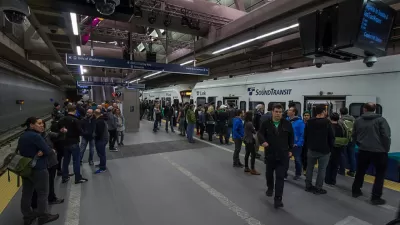Seattle, home to the most infamously bungled infrastructure projects in the country (the Bertha-blocked tunnel), has managed to do something rare for any city: complete a transit extension on-time and under-budget.
"Not only does Sound Transit expect its major light rail extension to be more than $100 million under budget, it also says the project will be finished by March — six months ahead of schedule," according to an article by Eric Mandel.
The new extension will connect Husky Stadium with the neighborhood of Capitol Hill. Mandel provides the following vital statistics for the big extension:
The projected $1.9 billion project is supposed to add 71,000 riders to the system by 2030, bringing the system-wide total to 114,000. The project was funded through sales tax, Motor Vehicle Excise tax and federal grants. The extension is expected to create an eight-minute ride from UW to downtown and under an hour from the stadium to Sea-Tac.
Sound Transit spokesperson Bruce Gray is quoted in the article crediting risk management for the project's success in construction.
FULL STORY: Getting to U-District will get easier way sooner than expected

Planetizen Federal Action Tracker
A weekly monitor of how Trump’s orders and actions are impacting planners and planning in America.

DARTSpace Platform Streamlines Dallas TOD Application Process
The Dallas transit agency hopes a shorter permitting timeline will boost transit-oriented development around rail stations.

Four Reasons Urban Planners Can’t Ignore AI
It’s no longer a question of whether AI will shape planning, but how. That how is up to us.

Bikeshare for the Win: Team Pedals to London Cricket Match, Beats Rivals Stuck in Traffic
While their opponents sat in gridlock, England's national cricket team hopped Lime bikes, riding to a 3-0 victory.

Amtrak’s Borealis Exceeds First Year Ridership Expectations
205,800 passengers have boarded the St. Paul to Chicago line, well above initial MDOT projections.

Study: 4% of Truckers Lack a Valid Commercial License
Over 56% of inspected trucks had other violations.
Urban Design for Planners 1: Software Tools
This six-course series explores essential urban design concepts using open source software and equips planners with the tools they need to participate fully in the urban design process.
Planning for Universal Design
Learn the tools for implementing Universal Design in planning regulations.
City of Mt Shasta
City of Camden Redevelopment Agency
City of Astoria
Transportation Research & Education Center (TREC) at Portland State University
US High Speed Rail Association
City of Camden Redevelopment Agency
Municipality of Princeton (NJ)



























